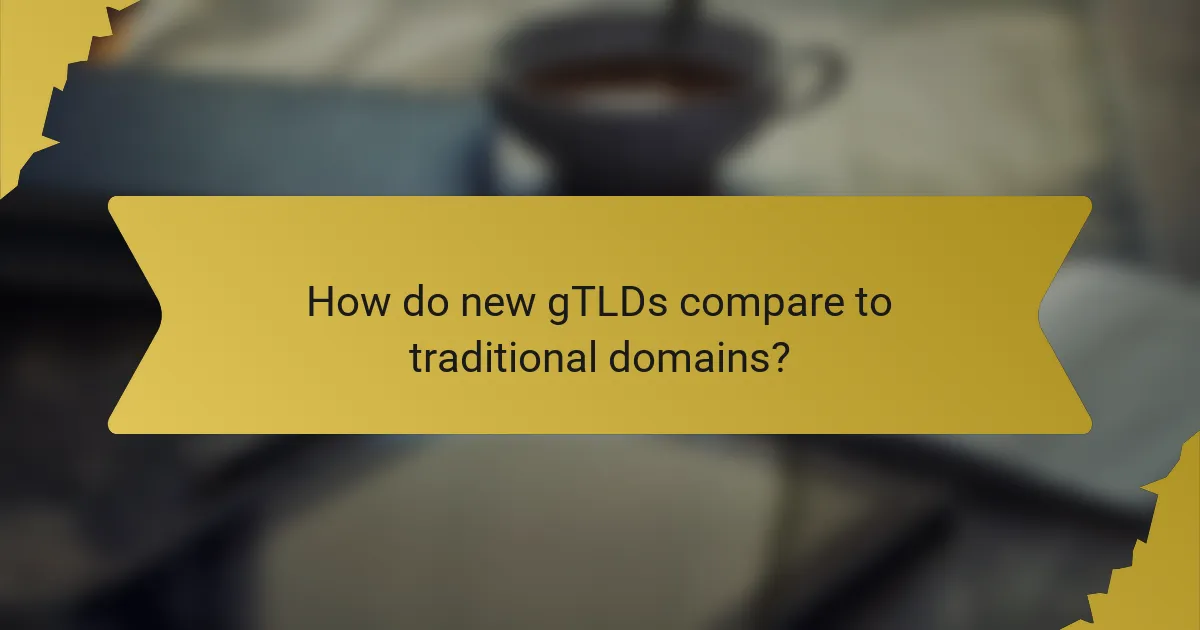New generic top-level domains (gTLDs) present US entrepreneurs with valuable opportunities to strengthen their online identity and reach targeted audiences. By leveraging these domains, businesses can enhance brand recognition, improve search engine visibility, and effectively engage with their customers, ultimately standing out in a competitive market.

How can new gTLDs benefit US entrepreneurs?
New generic top-level domains (gTLDs) provide US entrepreneurs with unique opportunities to enhance their online presence and connect with specific audiences. By utilizing these domains, businesses can improve brand recognition, optimize search engine performance, and engage more effectively with their target market.
Enhanced brand visibility
New gTLDs can significantly enhance brand visibility by allowing businesses to choose domain names that reflect their identity or industry. For example, a tech startup might opt for a .tech domain, making it immediately clear what they do. This specificity helps brands stand out in a crowded market.
Additionally, using a relevant gTLD can create a memorable web address, which is crucial for word-of-mouth marketing. A unique domain can make it easier for customers to recall and share your website, increasing overall traffic.
Improved SEO performance
Utilizing new gTLDs can lead to improved search engine optimization (SEO) performance. Search engines increasingly consider domain relevance when ranking websites, so a well-chosen gTLD can enhance your site’s visibility in search results. For instance, a .shop domain may rank better for e-commerce searches compared to a generic .com.
Moreover, having a keyword-rich domain can help attract organic traffic. Entrepreneurs should consider incorporating relevant terms into their domain name to leverage this advantage effectively.
Targeted audience engagement
New gTLDs enable entrepreneurs to engage with specific audiences more effectively. By selecting a gTLD that resonates with their target demographic, businesses can create a sense of community and belonging. For example, a local bakery might use .bake to connect with food enthusiasts in their area.
This targeted approach can foster loyalty and encourage repeat visits, as customers feel more aligned with brands that speak directly to their interests or needs.
Increased domain name options
The introduction of new gTLDs has expanded the pool of available domain names, making it easier for entrepreneurs to find a suitable web address. With many traditional .com domains already taken, new gTLDs provide alternatives that can be both creative and relevant to a business’s mission.
Entrepreneurs should explore various gTLD options to find a name that not only fits their brand but also aligns with their marketing strategy. This flexibility can be crucial for startups looking to establish a strong online presence.
Facilitated niche marketing
New gTLDs allow for more effective niche marketing by enabling businesses to tailor their domain names to specific industries or interests. For instance, a fitness brand might choose a .fit domain to attract health-conscious consumers. This specificity can help in targeting marketing efforts more precisely.
By aligning the domain with niche markets, entrepreneurs can enhance their appeal and differentiate themselves from competitors. This strategy can lead to higher engagement rates and improved conversion metrics.

What are the specific advantages of using new gTLDs?
New generic top-level domains (gTLDs) offer several advantages for US entrepreneurs, including unique branding opportunities, improved alignment with business identity, and enhanced access to global markets. These benefits can help businesses stand out in a competitive landscape and better connect with their target audiences.
Unique domain extensions
New gTLDs provide a wide variety of domain extensions that can reflect specific industries, interests, or locations. For example, extensions like .tech, .design, or .shop allow businesses to convey their focus directly in their web address. This uniqueness can make a domain more memorable and relevant to potential customers.
Entrepreneurs should consider how these unique extensions can enhance their marketing efforts. A distinctive domain can improve search engine visibility and brand recognition, which are crucial for attracting traffic and building a loyal customer base.
Better alignment with business identity
Using new gTLDs allows businesses to choose domain extensions that align closely with their brand identity and mission. For instance, a nonprofit organization might opt for .org, while a local bakery could use .bake. This alignment helps communicate the essence of the business right from the URL.
When selecting a gTLD, entrepreneurs should reflect on their brand values and target audience. A well-chosen domain extension can reinforce the brand message and create a cohesive online presence that resonates with customers.
Access to global markets
New gTLDs can facilitate access to international markets by allowing businesses to select domain extensions that appeal to specific regions or languages. For example, a company targeting European customers might choose a .eu extension, while one focusing on Spanish-speaking markets could use .es.
Entrepreneurs should research the global implications of their chosen gTLDs. Understanding local preferences and cultural nuances can help in selecting the right domain extension to effectively reach and engage diverse audiences across the globe.

How do new gTLDs compare to traditional domains?
New generic top-level domains (gTLDs) offer distinct advantages over traditional domains, primarily in terms of branding and availability. While traditional domains often have limited options, new gTLDs expand the possibilities for entrepreneurs by providing more choices and flexibility.
Cost-effectiveness
New gTLDs can be more cost-effective than traditional domains, especially for startups and small businesses. Registration fees for new gTLDs often range from $10 to $50 per year, which can be competitive compared to traditional domains that may cost more due to higher demand.
Additionally, many registrars offer promotions and discounts for new gTLDs, making them a budget-friendly option for entrepreneurs looking to establish an online presence without breaking the bank.
Flexibility in branding
New gTLDs provide entrepreneurs with greater flexibility in branding their businesses. With a wider variety of domain endings, such as .tech, .design, or .shop, businesses can choose a domain that closely aligns with their industry or niche.
This flexibility allows for more creative and memorable domain names, which can enhance brand recognition and appeal to target audiences. For example, a bakery could use .bake, making their domain both descriptive and unique.
Availability of desired names
One of the most significant benefits of new gTLDs is the increased availability of desired domain names. Traditional domains often have many names already taken, leading to frustration for entrepreneurs trying to secure a suitable online identity.
With new gTLDs, the chances of finding an available domain that matches your brand or business name are much higher. This can lead to a more cohesive online presence and help businesses stand out in a crowded market.

What criteria should US entrepreneurs consider when choosing a gTLD?
US entrepreneurs should consider relevance, marketability, and future expansion potential when selecting a generic top-level domain (gTLD). These factors can significantly influence a business’s online presence and growth opportunities.
Relevance to business sector
Choosing a gTLD that aligns with your business sector is crucial for establishing credibility and attracting the right audience. For instance, a tech startup might opt for a .tech gTLD, while a nonprofit organization may prefer .org. This alignment helps customers quickly identify the nature of your business.
Consider industry-specific gTLDs that resonate with your target market. Using a relevant gTLD can enhance your brand’s visibility and make it easier for potential customers to find you online.
Marketability of the domain
The marketability of a domain name is vital for effective branding and marketing. A memorable and relevant gTLD can improve your website’s search engine optimization (SEO) and make it easier for customers to recall your web address. For example, a catchy name with a .store gTLD can attract more visitors to an e-commerce site.
Evaluate how the gTLD fits into your overall marketing strategy. A strong domain name can enhance your advertising efforts and social media presence, making it easier to promote your brand across various platforms.
Potential for future expansion
When selecting a gTLD, consider its potential for future business expansion. A gTLD that is too niche may limit your growth if you decide to diversify your offerings. For example, a .photography gTLD might restrict a photography business from branching into videography or digital marketing.
Choose a gTLD that allows flexibility for future projects or services. This foresight can save you the hassle of rebranding later, ensuring that your online identity remains consistent as your business evolves.

What are the emerging trends in gTLD usage?
Emerging trends in generic top-level domain (gTLD) usage reflect a shift towards more specialized and relevant domain names for businesses. Entrepreneurs in the US are increasingly adopting these gTLDs to enhance their online presence and align their web addresses with their industry or niche.
Rise of industry-specific gTLDs
Industry-specific gTLDs, such as .tech, .shop, and .design, are gaining traction among businesses looking to establish a clear identity. These domains help convey the nature of a business instantly, making it easier for customers to understand what a company offers. For example, a tech startup using .tech can signal its focus on technology right from the web address.
Choosing an industry-specific gTLD can also improve search engine optimization (SEO) by incorporating relevant keywords directly into the domain name. This can lead to higher visibility in search results, attracting more targeted traffic to a website.
Increased adoption by startups
Startups are increasingly opting for new gTLDs as they seek to differentiate themselves in competitive markets. These domains often provide more availability compared to traditional options like .com, allowing entrepreneurs to secure a memorable and relevant web address. This is particularly beneficial for startups that may struggle to find an available .com domain that matches their brand.
Moreover, the cost of registering new gTLDs is often comparable to traditional domains, making them an attractive option for budget-conscious startups. Entrepreneurs should consider the branding potential of these domains as part of their overall marketing strategy.
Integration with digital marketing strategies
Integrating gTLDs into digital marketing strategies can enhance brand recognition and customer engagement. Using a relevant gTLD can create a cohesive brand image across various platforms, from social media to email marketing. For instance, a business using .store can leverage this domain in promotional campaigns to emphasize its retail focus.
Additionally, businesses should ensure that their gTLD aligns with their overall marketing goals and target audience. This alignment can improve the effectiveness of campaigns and foster customer trust. Entrepreneurs should regularly evaluate the performance of their gTLDs and make adjustments as necessary to optimize their online presence.

How can US entrepreneurs leverage new gTLDs for growth?
US entrepreneurs can leverage new generic top-level domains (gTLDs) to enhance their online presence, improve branding, and target specific markets. By choosing relevant gTLDs, businesses can create memorable web addresses that resonate with their audience and reflect their industry or niche.
Enhancing Brand Identity
New gTLDs offer unique opportunities for entrepreneurs to strengthen their brand identity. By selecting a gTLD that aligns with their business focus, such as .tech for technology companies or .shop for e-commerce, entrepreneurs can communicate their purpose more effectively. This can lead to increased recognition and trust among potential customers.
For example, a startup focused on sustainable products might choose a gTLD like .eco, which not only highlights their commitment to the environment but also attracts like-minded consumers. This strategic choice can differentiate them from competitors using traditional domains.
Improving Search Engine Optimization (SEO)
Utilizing new gTLDs can positively impact SEO by incorporating relevant keywords directly into the domain name. This can enhance visibility in search engine results, making it easier for potential customers to find the business online. Search engines like Google consider domain relevance as a factor in ranking, so a well-chosen gTLD can provide an advantage.
Entrepreneurs should research popular keywords in their industry and consider how a new gTLD can complement their overall SEO strategy. For instance, a local bakery might choose a gTLD like .bake to emphasize their specialty, potentially improving local search rankings.
Targeting Specific Audiences
New gTLDs allow entrepreneurs to target specific audiences more effectively. By selecting a domain that resonates with a particular demographic or interest group, businesses can create a more tailored online experience. This targeted approach can lead to higher engagement and conversion rates.
For instance, a nonprofit organization focused on education might opt for .education to attract educators and students. This clear messaging can foster a sense of community and encourage more individuals to engage with their initiatives.
Cost Considerations
While new gTLDs can provide significant benefits, entrepreneurs should be mindful of costs associated with registration and renewal. Prices for new gTLDs can vary widely, often ranging from low single-digit dollars to higher amounts depending on the popularity and demand of the extension. It’s essential to budget accordingly and consider the long-term investment.
Additionally, entrepreneurs should evaluate the potential return on investment (ROI) of choosing a new gTLD versus a traditional one. A well-chosen gTLD can lead to increased traffic and sales, justifying the initial expense.
